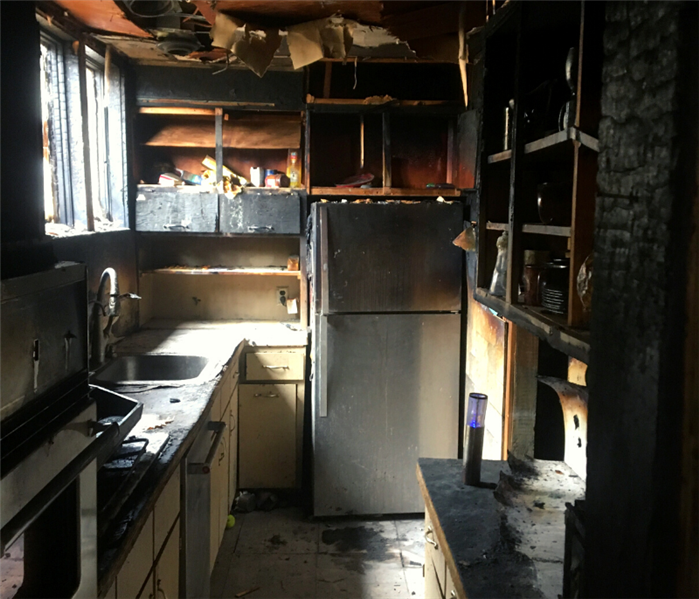How to Safely Put Out A Grease Fire
10/12/2020 (Permalink)
Even when practicing proper kitchen safety, starting a grease fire in your kitchen can happen in the blink of an eye. In fact, cooking related fires account for about 50% of all all reported home fires in the United States. Out of these kitchen fires, an unsurprising 52% were started by the ignition of cooking oil, fat, or grease. With the odds of starting a cooking fire so high - It's best to know how to stop a grease fire safely in your home.
Do's and Don'ts of Grease Fires
DO:
- Have baking soda, salt, or a Class B Dry Chemical Fire Extinguisher in your kitchen in case a grease fire starts.
- Have a metal lid nearby when cooking with fats or grease to quickly cut off oxygen to the pan.
- Use the correct type of cooking oils and follow proper safety guidelines when frying foods.
DO NOT:
- Try to pour water on the fire. This will only cause it to get worse and possibly cause hot grease to spill out of the pan and spread the fire.
- Don't move the pot or pan that the fire is in. This can feed the flames and burn you.
- Do not pour flower, baking powder, or other flammable cooking powders on to the fire.
How To Put Out A Grease Fire
- Assess the situation first. If the fire is small, just started, or is clearly confined to the pan you're cooking in, you can likely put it out yourself. However, if the fire is large or rapidly spreading, immediately leave the home and call 911 to report a grease cooking fire.
- Turn off the heat. Turn off the burner as soon as you can to stop the heat source of the fire.
- Smother the fire in baking soda or salt. Even a small fire will require a large amount of these everyday kitchen items to put it out. Do not throw these on to the fire from the side - This action may cause the fire to 'leap' out of the pan and spread. Using baking soda on a grease fire is one of the most tried and true methods for putting them out.
- Cover the pot. Use a large cookie sheet or the lid to the pan. A cookie sheet may be easier to place when there is an active fire from the burning oil, since you will not have to put your hands directly above the fire.
- Wait and watch. Don't assume you're safe just yet. Wait and make sure that the fire doesn't continue, and do not move or touch the pot until you are sure it has gone out and cooled.
- When you're unsure - Call 911! It's always better to be safe than sorry when it comes to dealing with a grease fire.
Ways to Prevent Grease Fires
Since the likelihood of starting a grease-related kitchen fire is so high, it's best to take steps to make sure you don't start them in the first place.
- Stay in the kitchen while cooking - especially when frying or using cooking oils. Unattended cooking the leading cause of kitchen fires.
- Keep items that could catch fire away from the stove.
- Do not put frozen foods into hot grease - or you may have a frozen turkey vs. deep fryer situation on your hands!
- Use grease or oils at their labeled recommended temperatures. When you see smoking or smell burning, immediately turn off the burner and remove the pan from the heat to prevent a fire from starting.
- Gently place foods in to a frying pan to prevent splattering of hot oils.
- Be sure to clean any grease traps on your stove or grill. Buildup of fats and oils can cause fires.
What Should You Do After A Grease Fire?
Once you or the fire department have put out your fire, what are the next steps? It's likely that even with a small fire, you're struggling with unwanted odors and smoke stains covering walls or cabinets. If a fire extinguisher was used, the powder may cover your entire kitchen. It's even possible that splattered grease may be covering your cooking area as well.
Call a fire damage restoration service.
These types of services can perform all cleanup related to a grease or kitchen fire - cleaning smoke, grease, and even removing unwanted odors from your home that you may not be able to get rid of yourself. If you filed an insurance claim, these companies can also work with your carrier to have no out-of-pocket costs to you.
Need Help? Call SERVPRO 24/7 - 800-734-3213
SERVPRO of Branford/Shoreline is a damage restoration company specializing in fire, water, mold and COVID-19 services. Whatever the damage, SERVPRO is here to make it "Like it never even happened."






 24/7 Emergency Service
24/7 Emergency Service
